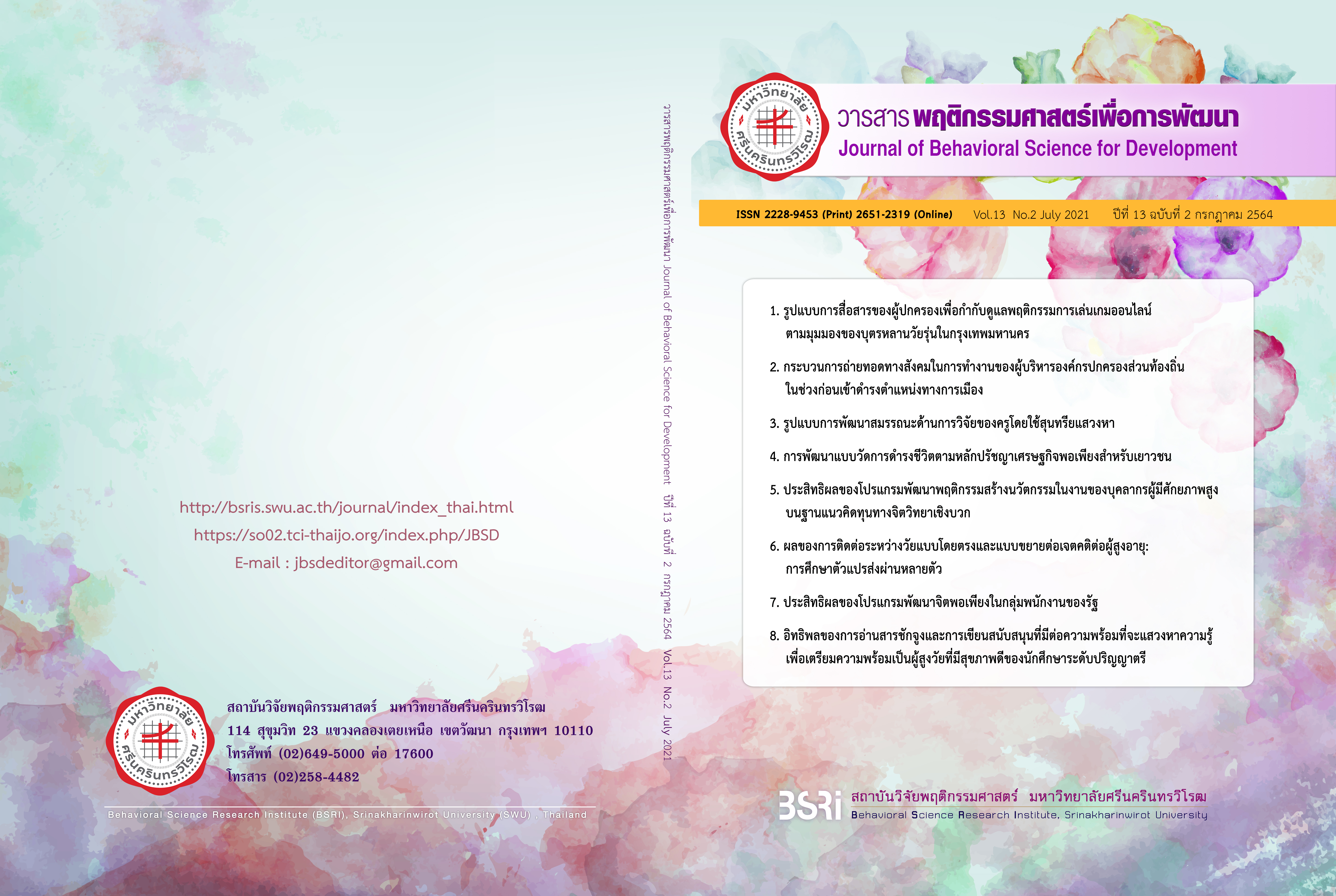The Development Model for Research Competency of Teachers Using Appreciative Inquiry
Keywords:
research competency, research competency development of teachers, appreciative inquiryAbstract
The objectives of this research were to develop and synthesize the model for developing research competency of the teachers under Samut Prakan Primary Educational Service Area Office 1 implementing the appreciative inquiry approach to the action research process. The research, which was conducted at two schools, one small-sized school and one medium-sized school, consisted of two phases. The first phase was constructing the research competency of the teachers using appreciative inquiry. The second phase was developing the model for developing the teacher competency using appreciative inquiry. Each phase involved four steps: 1) discovery, 2) dream, 3) design, and 4) destiny. Observation, interview, and group discussion were used to collect data. Content analysis was applied to analyze the collected data. Research results illustrated that research competency comprised of five key competencies, which were skills, knowledge, self-concept, traits, and motivations. Sixteen sub-competencies were selected by the researcher for the development including 1) problem and result analysis skills, 2) problem-solving skills, 3) behavior observation skills, 4) information retrieval skills, 5) knowledge about research writing, 6) knowledge about research methodology, 7) understanding of the causes and individual difference, 8) knowledge about instructional management, 9) traits of determination, 10) traits of observation, 11) traits of decision making and taking action, 12) traits of responsibilities to outcome, 13) traits of responsibilities to tasks, 14) traits of inquiry, 15) motivations for self-development and work achievement, and 16) motivations for paying attention to tasks. The development model for research competency of teachers using appreciative inquiry consisted of four elements: 1) searching for esteem experiences, 2) setting goals, 3) selecting good approach, and 4) reflecting learning outcomes.
References
Bada, S. O. (2015, November-December). Constructivism learning theory: A paradigm for teaching and learning. Journal of Research & Method in Education, 5(6), 66-70.
Cockell, J., & McArthur-Blair, J. (2012). Appreciative Inquiry in Higher Education: A Transformative Force. Jossey-Bass.
Cooperrider, D. L., Whitney, D., & Stavros, J. (2003). Appreciative Inquiry Handbook: The First in a Series of AI Workbooks for Leaders of Change. Berrett-Koehler.
Hummel, C. D. (2007). Use Appreciation Inquiries to Describe and Create Teacher Peaks. [Doctoral dissertation]. Wichita State University, United States.
Ketsang, P. (2016). Kānwičhai patibatkān [Laboratory research]. Printing Press of Chulalongkorn University.
Kolb, D. A. (1984). Experiential learning: Experience as the source of learning and development, Prentice Hall.
McClelland, D. C. (1993). Intelligence is not the best predictor of job performance. Current Directions in Psychological Science, 2(1), 5-6.
Muijeen, K. (2016, October-December). Kānsāng khwām suk dūai čhittawitthayā chœ̄ng būak [Creating happiness through positive psychology], Journal Science and Technology, 24(4), 673-681.
Office of the Basic Education Commission. (2010). Khūmư̄ pramœ̄n samatthana khrū (chabap prapprung) [Teacher Competency Assessment Manual (Revised version)]. http://www.tw-tutor.com/downloads/competency.pdf
Pathumanan, W. (2016, September-December). Kānphatthanā rūpbǣp kānrīanrū tām nǣokhit suntharīya sāthok phư̄a sœ̄msāng kānbō̜rihān čhatkān tonʻēng khō̜ng phūsūngʻāyu nai khēt Krung Thēp Mahā Nakhō̜n [The development of a learning model according to the aesthetic concept to enhance self-management of the elderly in Bangkok]. Silpakorn University Journal, 9(3), 857-870.
Pliansiri, P. (2012). Kānprayukchai suntharīya sāthok phư̄a phatthanākara būan kān sư̄pthō̜t tamnǣng phū nam nai chumchon thī mī ʻattalak thāng chāttiphan : Kō̜ranī sưksā chumchon bān mǣ khō̜ng sāi ʻamphœ̄ chīangdāo čhangwat Chīang Mai [The application of aesthetics to develop the succession process in Communities with Ethnic Identity: A Case Study of Ban Mae Khong Sai Community Chiang Dao District Chiang Mai Province] [Master of Science Thesis]. National Institute of Development Administration, Bangkok.
Seligman, M. E. P. (2011). Flourish: A visionary new understanding of happiness and well-being, Atria Books.
Sotthayakom, P. (2017). Kānwičhai phư̄a phatthanā khrū phū nam kān rīan kānsō̜n dōi chai suntharīya sawǣng hā khō̜ng rōngrīan nai sangkat samnakngān khēt phư̄nthī kānsưksā prathom sưksā Phra Nakhō̜n Sī ʻAyutthayā khēt nưng [Research to develop teachers who are teaching and learning using aesthetics Schools under the Office of Ayutthaya Primary Educational Service Area 1] [Doctor of Philosophy Thesis]. Behavioral Science Research Institute Srinakharinwirot University, Bangkok.
Tantiwiwat, S. (2017). Čhittawitthayā chœ̄ng būak : kānphatthanā kān prayuk læ khwām thāthāi [Positive psychology: Development, Applications, and Challenges], Journal of behavioral science for development, 9(1), 276-290.
Teacher Development Institute Faculty and educational personnel. (2007). Ekkasān prakō̜p kānphatthanā laksūt phatthanā phū nam kān plīanplǣng phư̄a rō̜ng rap kārok ra čhā yaʻam nā čhō̜ samrap phūbō̜rihān kānsưksā læ phūbō̜rihān sathān sưksā [Documentation for curriculum development to develop transformational leaders to support decentralization for education administrators and school administrators]. (n.p.).
Tosati, S. (2014). Kānsāng sœ̄m kān rūčhak tonʻēng phư̄a kānphatthanā tonʻēng khō̜ng nakrīan dōi chai krabūankān sư̄p sō̜p læ kānpramœ̄n bǣp chư̄nchom [Building self-awareness for the self-development of students by using an examination and appreciation assessment process] [Doctor of Education Thesis]. Chulalongkorn University, Bangkok.
Trajkovski, S., Schmied, V., Vickers, M., & Jackson, D. (2013). Using appreciative inquiry to transform health care. Contemporary Nurse, 45(1), 95–100.
Wangdi, S. (2015, July-December). Kānprayukchai suntharīya sāthok phư̄a phatthanā khwām phūkphan nai ʻongkō̜n [Applying aesthetics to improve corporate engagement]. Khon Kaen University Journal College of Graduate Studies in Management, 8(2), 17-38.
Watkins, J. M., Mohr, B., & Kelly, R. (2011). Appreciative inquiry change at the speed of Imagination. Pfeiffer.
Whitney, D., & Trosten-Bloom, A. (2010). The power of appreciative inquiry: A practical guide to positive change. Berrett-Koehler.
Wood, K. D. (2007). Experiences of transformative learning in the appreciative inquiry event [Doctoral Dissertation, Fielding Graduate University, 2007]. Dissertation abstracts international, 68(02). AI Commons. http://appreciativeinquiry.case.edu/research/bibCompletedDissertationsDetail.cfm?coid=10462
Downloads
Published
How to Cite
Issue
Section
License
Copyright (c) 2021 Journal of Behavioral Science for Development

This work is licensed under a Creative Commons Attribution-NonCommercial-NoDerivatives 4.0 International License.



